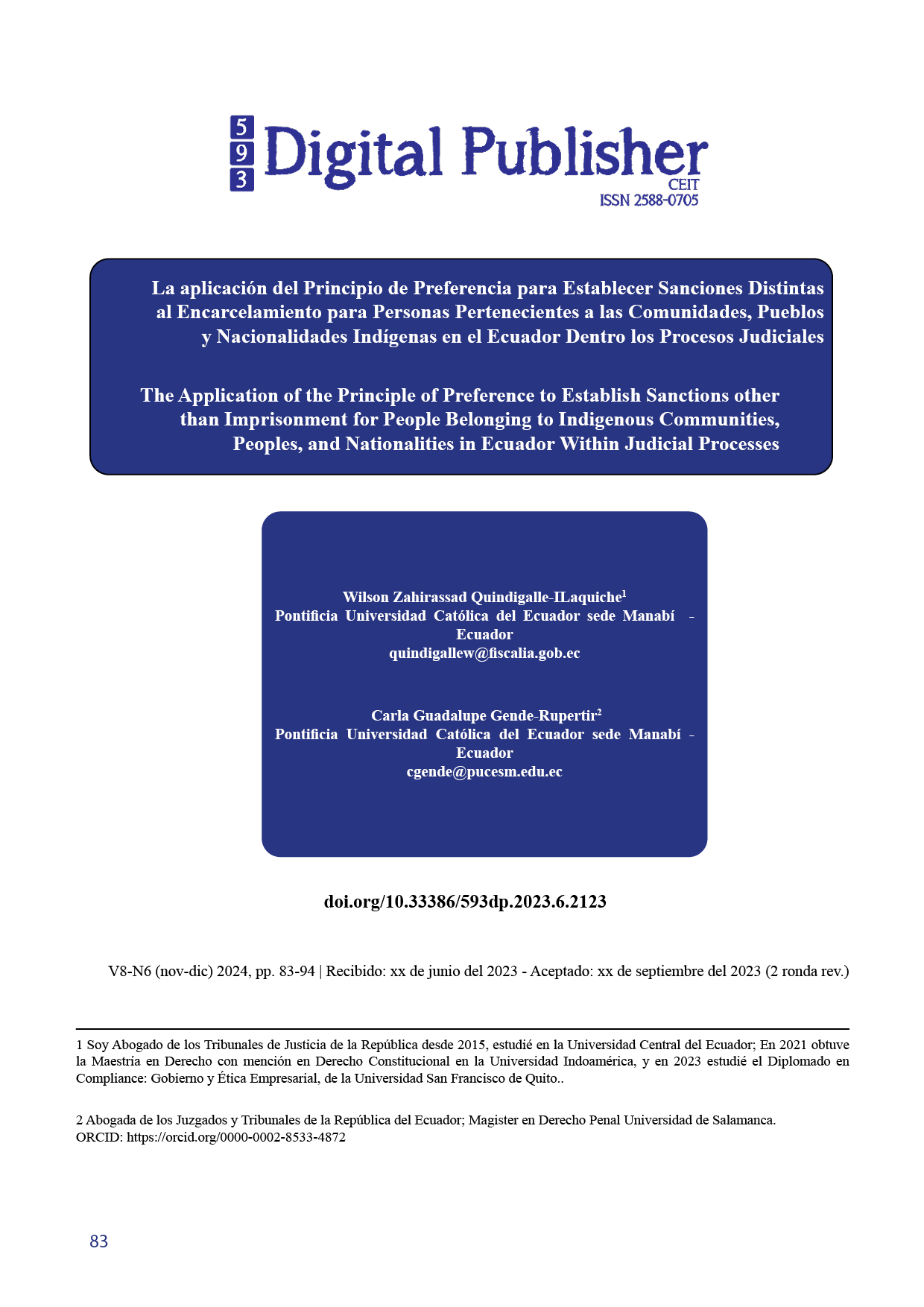The application of the principle of preference to establish sanctions other than imprisonment for people belonging to Indigenous communities, peoples, and nationalities in Ecuador within judicial processes
Main Article Content
Abstract
The legal problem that will guide this investigation is based on the repercussion that it will have within the Ecuadorian justice system, with the application of Convention 169 of the International Labor Organization (ILO), in relation to compliance with sanctions other than imprisonment for people belonging to indigenous communities, peoples and nationalities in Ecuador in legal proceedings. The methodology will be guided with the purpose of basing it on current regulations, whether national or international. It is known that Convention 169 clearly provides that preference should be given to types of sanctions other than imprisonment, from which follows the obligation of the operators of the justice system of the ordinary jurisdiction, who hear criminal proceedings and those who are followed against people belonging to indigenous communities, peoples and nationalities in Ecuador, penalties other than imprisonment must be applied, despite what is already established in the Comprehensive Organic Penal Code. That is why, within this investigation, the feasibility of the application of this international agreement in the different judicial processes will be verified.
Downloads
Article Details

This work is licensed under a Creative Commons Attribution-NonCommercial-ShareAlike 4.0 International License.
1. Derechos de autor
Las obras que se publican en 593 Digital Publisher CEIT están sujetas a los siguientes términos:
1.1. 593 Digital Publisher CEIT, conserva los derechos patrimoniales (copyright) de las obras publicadas, favorece y permite la reutilización de las mismas bajo la licencia Licencia Creative Commons 4.0 de Reconocimiento-NoComercial-CompartirIgual 4.0, por lo cual se pueden copiar, usar, difundir, transmitir y exponer públicamente, siempre que:
1.1.a. Se cite la autoría y fuente original de su publicación (revista, editorial, URL).
1.1.b. No se usen para fines comerciales u onerosos.
1.1.c. Se mencione la existencia y especificaciones de esta licencia de uso.
References
Asamblea Constituyente. (2009). Codigo Organico de la Funcion Judicial. Quito, Pichincha, Ecuador: Lexis.
Asamblea Constituyente de la Republica del Ecuador. (2008). Constitucion de la Republica del Ecuador. Montecristi: Nacional.
Asamblea General de las Naciones Unidas . (29 de junio de 2006). Declaracion de las Naciones Unidas sobre derechos de los pueblos indigenas . Obtenido de https://www.un.org/esa/socdev/unpfii/documents/DRIPS_es.pdf
Asamblea Nacional de la República del Ecuador . (2021 ultima reforma). Codigo Organico Integral Penal. Quito: LexisFinder.
Aylwin, J. (2002). El Derecho de los Pueblos Indígenas a la tierra y al Territorio en América Latina: Antecedentes Históricos y Tendencias Actuales Extensión: 35 páginas Año Publicación: 2002. Recuperado el 10 de junio de 2023, de Archivochile.com: http://www.archivochile.com/Ideas_Autores/aylwino_j/aylwinoj0002.pdf
Bazán, V., & Rojas, C. N. (2014). Justicia Constitucional y Derechos Fundamentales . Bogota : Universidad del Rosario, Facultad de Jurisprudencia .
Convención Americana sobre Derechos Humanos (Pacto de San José). (22 de noviembre de 1969). Secretaría General OEA (Instrumento Original y Ratificaciones) , 9-11. Recuperado el 10 de junio de 2023, de https://www.oas.org/dil/esp/1969_Convenci%C3%B3n_Americana_sobre_Derechos_Humanos.pdf
Díaz Ocampo, E., & Antúnez Sánchez, A. (2016). El Conflicto de Competencia en la Justicia Indigena del Ecuador. Temas socio-jurídicos, 106-107. doi:10.29375/01208578.2503
Fajardo, R. Y. (2000). Reconocimiento Constitucional del Derecho Indigena y la Jurisdiccion Especial en los Paises Andinos (Colombia, Perú, Bolivia y Ecuador) . Revista Pena y Estado # 4. Buenos Aires.
Indigenas, G. d.-D. (Febrero de 2008). Grupo de las Naciones Unidas para el Desarrollo. Obtenido de https://www2.ohchr.org/english/issues/indigenous/docs/UNDG-Directrices_pueblos_indigenas.pdf
Juez Ponente: Agustin Grijalva Jiménez . (21 de julio de 2021). Corte Constitucional del Ecuador . Obtenido de Sentencia No. 112-14-JH/21
Licta, R. I. (1 de marzo de 2001). Revista Yachaikuna. Obtenido de Administracion de Justicia Indigena en la Ciudad: http://icci.nativeweb.org/yachaikuna/1/illaquiche.pdf
Ministerio Coordinador de Patrimonio del Ecuador . (2004). Nacionalidades y Pueblos Indigenas, y políticas interculturales en Ecuador . Obtenido de http://www.mdgfund.org/sites/default/files/nacionalidades_y_pueblos_indigenas_web(1).pdf
Naciones Unidas Derechos Humanos . (04 de diciembre de 1986). Pagina Oficial de las Naciones Unidas . Obtenido de Declaración sobre el derecho al desarrollo: https://www.ohchr.org/es/instruments-mechanisms/instruments/declaration-right-development#:~:text=El%20derecho%20al%20desarrollo%20es%20un%20derecho%20humano%20inalienable%20en,fundamentales%2C%20a%20contribuir%20a%20ese
Naciones Unidas Derechos Humanos . (enero de 2023). Pagina Oficial de las Naciones Unidas . Obtenido de https://www.ohchr.org/es/instruments-mechanisms/instruments/convention-against-torture-and-other-cruel-inhuman-or-degrading
OEA, D. d. (2021). Pagina Oficial de los Estados Americanos . Obtenido de http://www.oas.org/dil/esp/indigenas_Elaboracion_del_Proyecto_de_Declaracion.htm
Pushaina, J. J. (16 de marzo de 2021). Revista de Derecho . Obtenido de Pluralismo Juridico: Avances Constitucionales Actuales : https://revistas.uasb.edu.ec/index.php/foro/article/view/2823/2604#info
Resolucion Legislativa Registro Oficial 304 . (24 de abril de 1998). Convenio Sobre Pueblos Indígenas y Tribales . Obtenido de https://biblioteca.defensoria.gob.ec/bitstream/37000/2739/1/CVN%20169%20CONVENIO%20SOBRE%20PUEBLOS%20IND%C3%8DGENAS%20Y%20TRIBALES.pdf
Santamaria, R. Á. (2013). Repositorio Institucional UASD-Digital . Obtenido de https://repositorio.uasb.edu.ec/bitstream/10644/3826/1/PI-2013-04-%c3%81vila-La%20prisi%c3%b3n.pdf
Santos, B. d., & Jiménez, A. G. (Octubre de 2012). Justicia Indigena, Plurinacionalidad e Interculturalidad en Ecuador . Obtenido de https://www.boaventuradesousasantos.pt/media/Justicia_Indigena_Ecuador.pdf
Yallico, M. Y. (01 de noviembre de 2022). Debatesindigenas.org. Obtenido de La Justicia Indigena por el Ecuador: https://www.debatesindigenas.org/notas/196-justicia-indigena-ecuador.html#:~:text=La%20justicia%20ind%C3%ADgena%20es%20parte,gobernanza%20misma%20de%20los%20pueblos.
Yumbay, D. M. (21 de junio de 2007). Pagina Llacta . Obtenido de El Ejercicio de la Administración de Justicia Indigena en el Ecuador : http://www.llacta.org/notic/2007/not0621b.htm



